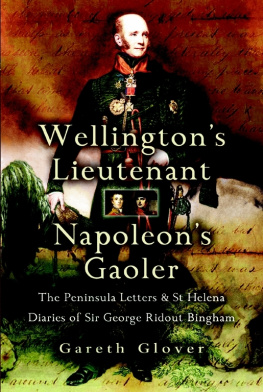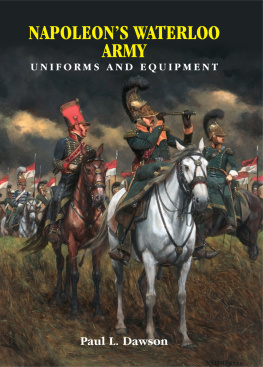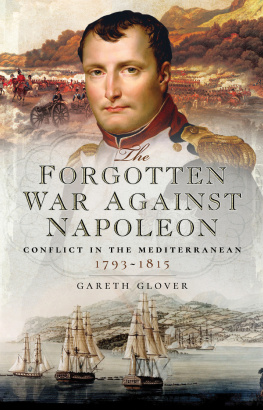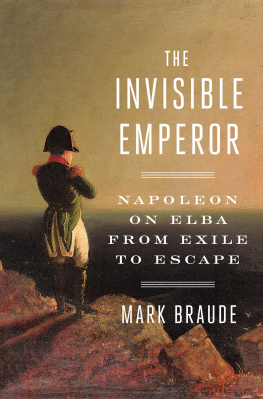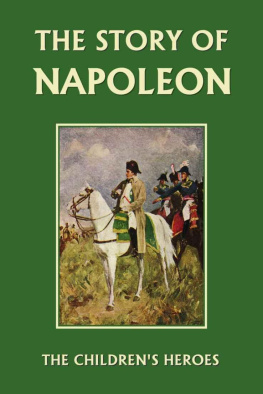FIGHTING NAPOLEON
Also by Gareth Glover and Published by Frontline Books
The American Sharpe
The Adventures of an American Officer of the 95th Rifles in the Peninsular and Waterloo Campaigns
The Waterloo Archive
Volume I: British Sources
The Waterloo Archive
Volume II: German Sources
The Waterloo Archive
Volume III: British Sources
The Waterloo Archive
Volume IV: British Sources
The Waterloo Archive
Volume V: German Sources
The Waterloo Archive
Volume VI: British Sources
An Eloquent Soldier
The Peninsular War Journals of Lieutenant Charles Crowe of the Inniskillings, 18121814
Wellingtons Voice
The Candid Letters of Lieutenant Colonel John Fremantle, Coldstream Guards, 18081837
From Corunna to Waterloo
The Letters and Journals of Two Napoleonic Hussars, 18011816
Waterloo: The Defeat of Napoleons Imperial Guard
Henry Clinton, the 2nd Division and the End of a 200-year-old Controversy
FIGHTING NAPOLEON
The Recollections of Lieutenant John Hildebrand 35th Foot in the Mediterranean and Waterloo Campaigns
This edition published in 2016 by Frontline Books,
an imprint of Pen & Sword Books Ltd,
47 Church Street, Barnsley, S. Yorkshire, S70 2AS
Copyright Gareth Glover, 2016
The right of Gareth Glover to be identified as the author of this work has been asserted by him in accordance with the Copyright, Designs and Patents Act 1988.
ISBN: 978-1-47388-684-1
eISBN: 978-1-47388-686-5
Mobi ISBN: 978-1-47388-685-8
All rights reserved. No part of this publication may be reproduced, stored in or introduced into a retrieval system, or transmitted, in any form, or by any means (electronic, mechanical, photocopying, recording or otherwise) without the prior written permission of the publisher. Any person who does any unauthorized act in relation to this publication may be liable to criminal prosecution and civil claims for damages.
CIP data records for this title are available from the British Library
For more information on our books, please visit
www.frontline-books.com
email
or write to us at the above address.
Foreword
O ver the last decade or so, I have had the privilege of publishing a large number of previously unknown memoirs of soldiers who fought in the Napoleonic wars, some of which are very extensive, whilst some are incredibly short indeed. But, I can honestly say, that every one of them has imparted at least one snippet of new information that has challenged my understanding of the subject, or was previously completely unknown to me.
Although we may think we now have a very good appreciation and knowledge of this period in history, much is still to be learnt. Unfortunately, many of these memoirs skirt over the commonplace, the norm, the everyday, because they were generally written contemporaneously and often only for a private family audience, who had no need or desire to be told about what was for them just ordinary life experiences.
That is precisely the problem regarding these letters and journals from 200 years ago, they often miss out the minor detail, which actually to both military and social historians is a veritable gold mine, in enabling us to understand better their everyday lives. It is this very basic detail which we quite often lack and for which we strive.
It is of course important to me as a military historian to understand the grand strategies, the movements of troops on campaign and on the battlefield and the weapons and uniforms they used. But just as significant and as important, if not more so, is the quest to understand their basic lives as humans thrown into, that unnatural state, war, and how they coped with it.
In the last decade, much of my work on this original source material has unsurprisingly been concentrated on the two best known and well-studied theatres of operations of the original Great War, as Victorians referred to the twenty-three years of world war against France and Napoleon. These of course are the Peninsular War (Spain, Portugal & Southern France 1808-14) and the Waterloo campaign of 1815. Consequently, over the last five years my search has been focussed very much on the Waterloo campaign, hardly surprising given the prominence of its 200th Anniversary in 2015 and the associated media attention.
Paradoxically, this anniversary and the subsequent ephemeral, perhaps superficial and fleeting world interest, has actually spawned a great drive to seek for a better understanding of every aspect of the campaign. I do not think that I over exaggerate the situation, by stating that the history of the battle and those that fought it has progressed farther in the last ten years than it had in the previous 150.
Although the quest for new material on these campaigns is certainly not at an end, it is understandable that many will wish to expand their horizons beyond those Belgian fields. Within the unbelievably fascinating and complicated period encompassing the all-embracing title The Napoleonic Wars are still many other theatres of operations where our knowledge and understanding is often very poor and incomplete.
I have therefore chosen to extend my work initially into the realms of the Mediterranean theatre. Many may be aware of some of the major events that occurred in this area of operations, which included the Siege of Toulon, Napoleons invasion of Egypt, Nelsons great victory at the Nile, the Battle of Maida and perhaps may also have a fleeting knowledge of the operations on the east coast of Spain.
But besides these individual actions, the Mediterranean is presumed to be a mere backwater, insignificant in comparison with the main events on continental Europe. But this is to belittle a major theatre of operations which was active throughout the entire duration of the war and had a marked bearing on the overall war effort in many profound ways. Indeed, in a more modern equivalent, it is similar to the entire Allied operations in North Africa and Italy from 1940-44 being reduced to nothing more than the battles of El Alamein, Tobruk and Monte Casino.
In fact, both of these campaigns, although 130 years apart, have suffered from the same problem, being completely overshadowed by the fighting in Western and Central Europe. There is simply a lack of knowledge of the constantly fluctuating fortunes of the protagonists and a basic lack of understanding of the greater strategic threat to either protagonist of losing control of the Mediterranean. It is high time that this was remedied.





